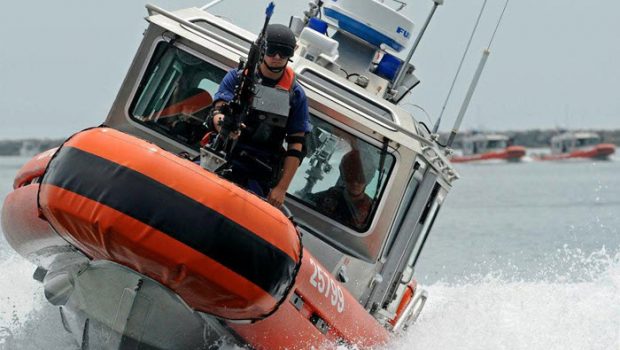Don't mess with the Coasties >> Scuttlebutt Sailing News
Published on January 31st, 2021
Nathan Libby of Rockland, Maine has been charged with making a false distress call to the Coast Guard via VHF-FM radio channel 16 on December 3, 2020.
Based on the call, the Coast Guard initiated a search spanning more than five hours, which included the use of a local Coast Guard vessel, a Maine Marine Patrol vessel, and a helicopter from Coast Guard Air Station Cape Cod.
A criminal complaint was filed on January 27 in the U.S. District Court in Portland against Libby, who faces up to five years in prison and a $250,000 fine if convicted of the crime.
“Our Coast Guard rescue crews thrive on taking risks for the sake of helping others in trouble on the water,” said Capt. Brian LeFebvre, commanding officer of Coast Guard Sector Northern New England. “Calls like this hoax call – unnecessarily put our rescue crews at risk, drain resources, and may limit our ability to respond to actual emergencies”.
The success of this investigation is a result of the combined efforts of the Coast Guard Investigative Service, Department of Justice, Maine Marine Patrol, and Rockland Police Department.
So what did Libby do?
The Coast Guard received a mayday call shortly after 6:30 am in which the dispatcher spoke with a man who said he was on a boat that had lost its rudder and was taking on water fast and the pumps couldn’t keep up.
“Mayday, mayday, mayday,” says the voice in an audio recording released by the Coast Guard Sector Northern New England. “We lost our rudder and we’re taking on water fast. I just don’t have enough pumps to keep up with it.”
The man said there were three people aboard the boat and they were in Spruce Head Harbor and trying to get to the Atwood float.
Marine Patrol Officer Nicholas Stillwell responded to Atwood Lobster Co.’s wharf on Spruce Head Island in South Thomaston and boarded a private vessel in an attempt to locate the boat that made the distress call. No vessel was located.
Stillwell returned to the dock and spoke to Libby, a dock worker at the neighboring Spruce Head Fisherman’s Co-op. Libby provided Stillwell with a list of boats that had gone out that morning.
The officer then spoke to someone else at the co-op and played the recording of the distress call. That person said the voice sounded like Libby. The officer went back and spoke to Libby, who said he had heard the distress call. He also acknowledged the co-op office had a VHF radio that was on Channel 16.
The officer taped Libby and his voice was compared to the distress call by an associate research professor at the Language Technologies Institute School of Computer Science at Carnegie Mellon University in Pittsburgh. Associate Professor Rita Singh concluded the voice on the distress call was the same as Libby’s, the affidavit states.
Surveillance video showed that Libby was at the co-op office at the time the distress call was made. And a check from a radio tower showed the call came from the direction of the co-op.
The hoax call came less than two weeks after the Coast Guard mounted an extensive search for four fisherman who were aboard the Portland-based Emmy Rose when it sank off Cape Cod on November 23. The search turned up debris and an empty life raft but the fishermen were never found.
Source: US Coast Guard, Portland Press Herald
By accepting you will be accessing a service provided by a third-party external to https://oc3anclub.com/




